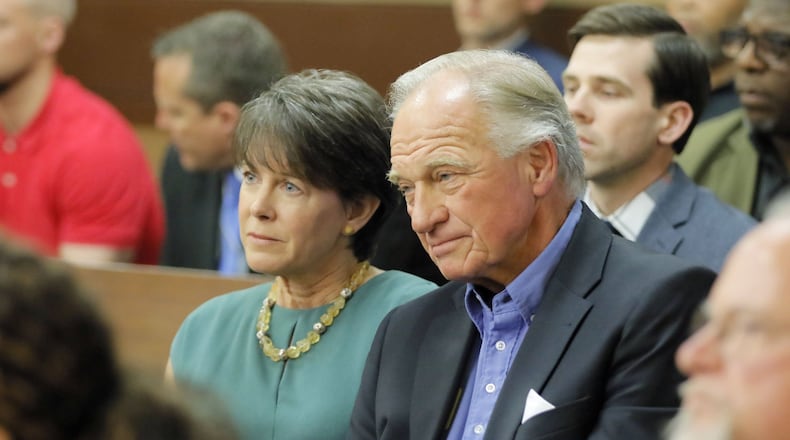Six years of competing legal maneuvers culminated Wednesday when a Fulton County jury found the ex-housekeeper of the chairman of Waffle House not guilty on charges of unlawful surveillance.
Also acquitted on those same charges were the two attorneys that Mye Brindle, the former housekeeper, had retained for a 2012 civil lawsuit against chairman Joe Rogers Jr.
In a trial that called into question the nuances of Georgia's privacy laws, Brindle was accused of making a clandestine recording of herself engaging sexually with Rogers in his bedroom in 2012. Because attorneys David Cohen and John Butters had advised Brindle to make the recording, they were also charged.
Unlawful surveillance is a felony that carries a maximum penalty of five years in prison or a $10,000 fine, or both. Cohen and Butters were each charged with one count; Brindle was charged with two. The jury acquitted the three defendants on all charges after two days of deliberation.
Brindle and Rogers regularly had sexual encounters, according to their testimonies. Rogers said the encounters were consensual, while Brindle said she feared losing her job if she refused Rogers. She said she recorded the video — which was shown twice in open court — to use as evidence in a sexual harassment lawsuit.
At the heart of the trial was a Georgia law that makes it illegal for “any person, through the use of any device, without the consent of all persons observed, to observe, photograph, or record the activities of another which occur in any private place and out of public view.”
Prosecutors and defense attorneys spent much of the trial debating the meaning of "private place out of public view," with the defense arguing that because Brindle was invited into the home as a guest, Rogers relinquished the expectation of privacy inside his home.
Fulton County Assistant District Attorney Donald Wakeford balked at this interpretation, saying it would open the door for anyone — “nannies, home nurses, tutors, handymen, exterminators and pizza delivery boys” — to record homeowners without their consent.
Wakeford also disagreed with the defense’s contention that as long as one person — in this case, Brindle — consented to being recorded per Georgia’s “one party consent” law, the recording was legal. That law, Wakeford said, only applies to audio communications, not video.
The courtroom was full of tearful embraces on Wednesday as the defense celebrated its victory. And one of the defendants, Cohen, had harsh words for the prosecution.
“Everybody knows that (Fulton County District Attorney Paul) Howard has been carrying around a large bucket of political water,” Cohen said. “He turned his back on all women who mustered the strength and dared to stand up and say no. The jury sent a loud message to him and Mr. Rogers today. I couldn’t be more proud of Ms. Brindle.”
The defense has argued throughout the trial that Rogers used his personal power to bring the case before a judge. Rogers left the courtroom immediately after the verdicts were read, before he could be asked for comment.
Brooke Stewart, Cohen’s fiancée and a lawyer herself, said the verdict is a welcome relief. The two are engaged to be married next week.
“He (Cohen) did not deserve this,” she said. “It’s difficult to see this kind of abuse of power, but I knew he was a strong man and I could not be prouder of him.”
The acquittals are the only definitive resolution reached so far in what has become a six-year-long web of competing civil and criminal litigation. Fulton County Superior Court Judge Henry Newkirk threw out the charges against Brindle, Cohen and Butters last year, only to have them reinstated by the Georgia Supreme Court in November.
But even though it has been a long road to this verdict, the journey isn’t over yet. Brindle and Rogers still have lawsuits pending against one another in Cobb County. And Rogers’ attorney, David Conley, emphasized that this criminal trial wasn’t brought as a strategy for gaining the upper hand over Brindle in that civil litigation.
“This certainly wasn’t pursued to gain any advantage in the civil suit. He was the victim of a crime,” Conley said.
And Conley and other lawyers agreed that because there’s a different standard of proof in civil court, Wednesday’s verdict might not carry much weight in those lawsuits anyway.
“It might not mean as much as you might think,” said Reid Thompson, Brindle’s attorney — although Thompson also noted, “It’s certainly better than the other outcome. A guilty verdict would have been devastating.”
Prosecutors declined to comment on the verdict.
About the Author






